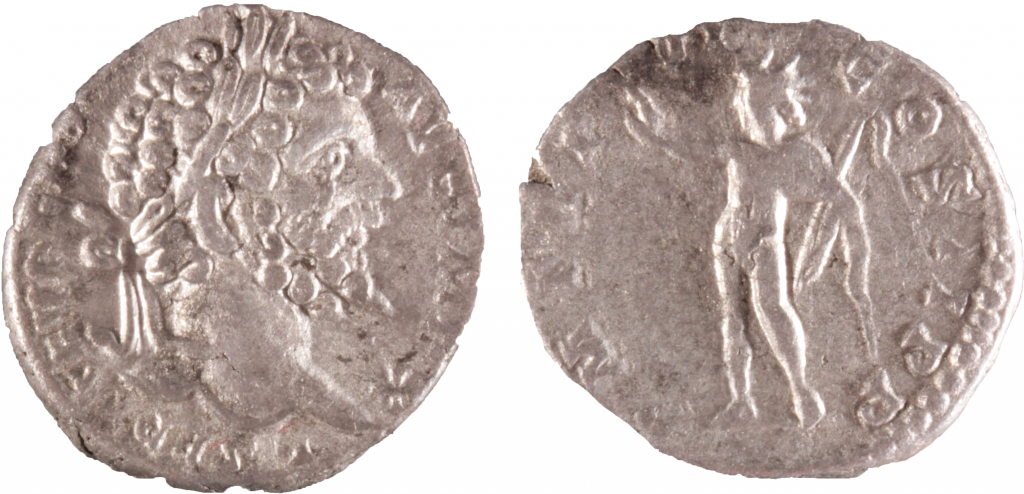April 11, 2015, by Will Leveritt
On this day the Roman emperor Septimius Severus was born
Text by Annabel Rock-Clarke
Image by Kelly Grimshaw
The Roman emperor Lucius Septimius Severus was born on 11 April AD 145/146 in Leptis Magna, modern day Libya, the first emperor to be born in Africa. Ancient sources, in particular, make reference to his appearance and descent, noting that he retained his African accent throughout his life.

AR denarius of Septimius Severus. Obverse shows laureate head of emperor right, L SEPT SEV PERT AVG IMP X. Reverse has Sol holding whip and wearing radiate crown, P M TR P VI COS II PP. 16mm, 2.66g, 7 o’clock.
Severus spent his early life in Leptis Magna and spoke the local Punic language as well as being educated in Latin and Greek. He also received lessons in oratory. According to Cassius Dio, Severus was eager to learn and yearned for more education than he actually received.
Severus’ political career began with his entry into the senatorial ranks, granted to him by the emperor Marcus Aurelius, enabling him to start his journey on the cursus honorum. In December AD 169 Severus took office as quaestor, but his activities between AD 170 and 180 are largely unrecorded. However, we do know that in AD 175, he married a woman from Leptis Magna, Paccia Marciana; the marriage lasted for more than ten years, but produced no children. His later marriage to Julia Domna produced two sons, Caracalla and Geta.
Towards the end of the emperor Commodus’ reign, in AD 190, Severus became consul. An assassination plot began to form around the emperor, led by Laetus, an African friend of Severus. Laetus placed several close associates in key positions of the empire, one being Severus, who was appointed governor of Upper Pannonia. The plot succeeded and Commodus was assassinated in December AD 192.
Publius Helvius Pertinax replaced Commodus, and was, in turn, murdered by the Praetorian Guard in March AD 193. Marcus Didius Julianus then bought the imperial title, which caused the armies in the provinces to revolt against him. Each of these armies proclaimed different men as the new emperor. The British legions proclaimed Claudius Albinus, the Eastern legions proclaimed Pescennius Niger and the Pannonian legions proclaimed Septimius Severus. Severus defeated Niger and Albinus at the battles of Issus and Lugdunum respectively, securing full control over the empire. The aftermath of these victories display the cruelty, which became characteristic of Severus and his reign. In addition to the execution of Pertinax, and the deaths of Niger and Albinus, forty-one senators, who were accused of supporting Albinus were executed together with their wives and children.
Despite his cruel nature, Severus did much to better the empire. He was a strict administrator when it came to the law, assuming both the legislative and executive power of the Senate. The provinces saw a period of peace, cities were re-populated and roads were repaired. His also discharged the Praetorian Guard and replaced it with a new Guard of 50,000 of his own loyal soldiers. He also launched campaigns in both Africa, in AD 202, and Britain, in AD 208, where he died in Eboracum, modern-day York, on 4February AD 211.
No comments yet, fill out a comment to be the first

Leave a Reply